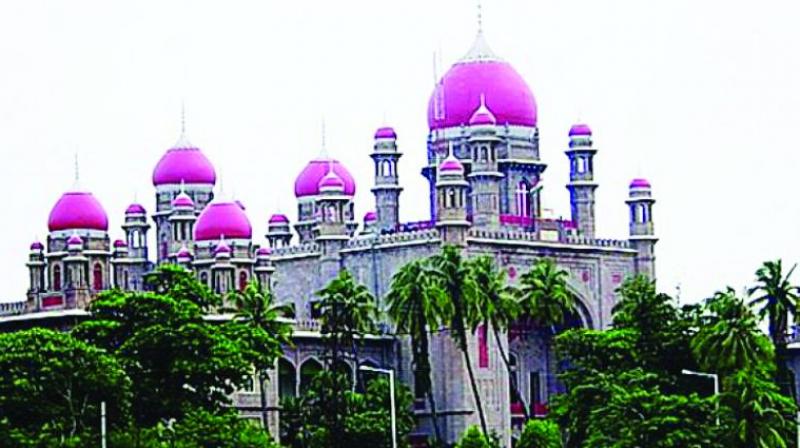Hyderabad: Shortage of judges leaves cases in limbo

Hyderabad: Judges working in the Hyderabad High Court have to shoulder a heavy case load because of the shortage of judges.
There are 3.21 lakh cases pending in the court and since May 2015 the court has been functioning with an Acting Chief Justice.
The Hyderabad High Court is the common High Court for Andhra Pradesh and Telangana and currently it is functioning with just 30 judges, less than half of the sanctioned strength of 61 judges.
Lawyers from AP and Telangana have been agitating for two years for the vacancies to be filled and the appointment of a regular Chief Justice.
About a month ago, the Supreme Court collegium cleared Justice T.
Radhakrishnan for the post of Chief Justice, but the central government has not cleared the appointment yet. Last year, the Collegium had cleared Justice Dama Seshadri Naidu’s transfer from the Kerala High Court to the Hyderabad High Court, which has also not materialised to date.
According to Jalli Kanakaiah, president of the Telangana High Court Advocates Association, and Challa Dhananjay, president of the AP High Court Advocates Association, each judge of the High Court has been burdened with the allocation of additional subjects due to the shortage of judges.
They have demanded that the Centre and the Supreme Court immediately take steps to fill the vacancies and appoint a regular Chief Justice.
Sarasani Satyam Reddy, senior advocate, said that due to the shortage, judges are forced to deliver orders in a hurry which may sometimes result in mistakes.
He said every judge must be assisted by a judicial clerk — as is the practice in the Supreme Court — who will prepare the note file of each case, which helps the judge understand the case and shortens the arguments of advocates of both sides.
But he said being overburdened by cases cannot be an excuse for a judge to keep on adjourning a case.
60% of cases pending as counters are not filed in Courts
Judges have various administrative duties apart from the legal work of hearing cases, which adds to the delay in disposing of cases.
A sitting judge of the High Court in an off the record talk said that each judge of the High Court has to look after administrative affairs of subordinate courts in the district in which he was nominated as the portfolio judge.
He said that the portfolio judge has to oversee the administrative and judicial functions of judicial officers of the district, including the maintenance of infrastructure, and prepare their annual credential reports and also periodical assessments of the orders passed by them.
He said that there is wrongly presumed by people that a judge works only five days a week from 10.30 am to 4.30 pm.
Actually, a High Court judge has to make periodic visits to subordinate courts in the district that are under his administrative control and also conduct workshops for them to improve their skills. These functions are discharged on Saturday and Sunday and not on regular court days.
The judge held the government — one of the biggest litigants — largely responsible for the pendency of cases.
“We are unable to dispose of cases finally as the executive functionaries are not filing the counter affidavits. I believe that more than 60 per cent of cases are pending for want of counter affidavits.” The judge felt that if the executive authorities would only take decisions as per the rule book, people will not have to knock on the doors of the High Court.
As the High Court has extraordinary jurisdiction under Article 226, people approach it for every little work like house permission, passport and even for a tap and electrical connection, leave aside the many land disputes with the Revenue authorities.
According to sources in the judiciary, there are about 34 committees in the High Court of which judges are members, and each judge has to be a part of one or other committee and some of them are members of more than three committees, which have to oversee the E-Courts project, Library, Disciplinary proceedings and other administrative matters.
The sitting judge said that a judge has to do a lot of homework to understand the cases coming before him. He has to update himself about the latest case laws and also on happenings in society.

